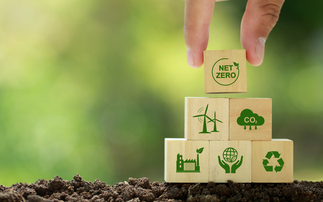BusinessGreen is asking key green business leaders for their views on the importance of the climate change talks due to take place in the French capital at the end of this year.
This week we spoke to Marie-Claire Daveu, chief sustainability officer and head of international institutional affairs for Kering, which owns brands including Puma, Alexander McQueen and Gucci.
BusinessGreen: What do you hope to see achieved in Paris?
I hope we will get a major agreement, one even more significant than the Kyoto protocol. For me, it's really a necessity if we want to tackle this issue, which is the most important issue of our century. The impact that climate change is already having on people, on biodiversity and on the environment will only increase. It is crucial that we reverse the trajectory we are on.
What do you think will be agreed?
I expect the Paris treaty will include engagement from each country to reduce greenhouse gas emissions, but with very different timelines and figures according to the development levels and the needs and capacities for each country, as well as the volume of emissions already used in each country (per inhabitant). Furthermore, I think there will be major progress around financing investments to reduce emissions, and a huge step towards the one hundred billion US dollars a year that has to be financed by developed Northern countries towards solutions in developing Southern countries. I also think a set of solutions for the exchange of best practices, new innovations and collaborations called the "Agenda of Solutions" will be further developed and strengthened.
How would a Paris deal impact your business?
Our sustainability strategy is very forward thinking and incorporates the realities of climate change and adaption, so we are prepared for various outcomes and view a progressive treaty favorably. In my view, the Luxury sector is actually well positioned to point the way towards a more sustainable business model, alongside its entire supply chains. Luxury sets the trends and its innate creativity can also be harnessed towards innovating new solutions. As such, we are encouraged by the cross-industry interest in our Environmental Profit and Loss accounting concept, and I hope that the Paris treaty will further encourage companies to implement natural capital accounting more broadly and that full transparency in sustainability reporting becomes ‘de rigueur'. Furthermore, the fact that we offset our carbon emissions at Kering should become the standard, because in the long term the activities on our planet, among them business activities, must be carbon neutral.
Do you think green businesses are making themselves heard?
Yes, I do. COP21 and its preparation involves numerous stakeholders: governmental agencies, NGO's, civil society and also representatives from the business community. In my view, business has a significant responsibility and a critical role to play in this - we rely on natural resources both directly and indirectly, we have an excellent track record working with governmental agencies, we are built to be international and we have resources, as well as the entrepreneurial thinking to innovate and find new solutions for the challenges we are facing as a society. These characteristics mean that we can be a strong voice and an important ally in the quest to build a green economy and a more sustainable world.
In 240 characters what would your message be to the lead negotiators?
You are the architects for the 21st Century. While economic growth needs to be strong, there must be less use of raw materials, and fossil fuels resulting in GHG emissions. Be bold. Be innovative. Define a new, level playing field. On your shoulders rests the responsibility to save the planet and to sustain humankind.
Are you going to the Paris summit and how are you getting there?
As I'm living and working in Paris, and Kering is participating in various ways, I will be there and of course use carbon-free transportation.
This article is part of BusinessGreen's Road to Paris hub, hosted in association with PwC










